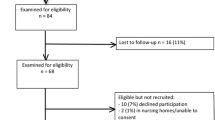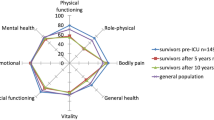Summary
The well-being of children after surviving intensive care is mainly determined by physical and psychosocial sequelae. The little available evidence shows that the long-term sequelae can be serious. The psychosocial sequelae are more important for quality of life than the physical sequelae. The psychosocial sequelae consist of cognitive problems and symptoms of posttraumatic stress disorder or depression. Long-term sequelae can be divided into domains as physical and psychological sequelae and functional status and health-related quality of life. Outcome studies have to be done on defined moments with validated questionnaires and study methods. Structured studies in prematures, children after cardio thoracic surgery and adults show the importance of follow-up studies for treatment during and after the intensive care period. In some Dutch centers follow-up studies are done in children who survive intensive care. The few available results affirm the importance of structured follow-up studies.
Samenvatting
Het welzijn van kinderen die een intensive care-periode overleven wordt vooral bepaald door morbiditeit op somatisch en psychosociaal gebied. Het schaarse onderzoek dat beschikbaar is, laat zien dat de langetermijngevolgen op zowel somatisch als psychosociaal gebied aanzienlijk kunnen zijn. De langetermijngevolgen op psychosociaal gebied zijn voor de ervaren kwaliteit van leven belangrijker dan de morbiditeit op somatisch gebied. De beschreven gevolgen op psychosociaal gebied zijn cognitieve problemen en symptomen die typisch zijn voor een posttraumatische stressstoornis of depressie. Langetermijngevolgen zijn dan ook in te delen in verschillende domeinen, zoals fysieke en psychische gevolgen, functionele status en gezondheidsgerelateerde kwaliteit van leven. Onderzoek naar deze domeinen dient op goed gedefinieerde meetmomenten en met behulp van gevalideerde vragenlijsten en onderzoeksmethoden te gebeuren. Gestructureerd onderzoek bij prematuren, kinderen na cardiochirurgische ingrepen en volwassenen laat het belang zien van follow-up-onderzoek voor de behandeling tijdens en de nazorg na de ic-behandeling. In een aantal centra in Nederland wordt follow-up-onderzoek gedaan bij kinderen na een ic-periode. De beschikbare resultaten bevestigen het belang van gestructureerd follow-up-onderzoek.
Similar content being viewed by others
Literatuur
Gemke RJ, Bonsel GJ. Pediatric Intensive Care Assessment of Outcome (PICASSO) Study Group. Comparative assessment of pediatric intensive care: a national multicenter study. Crit Care Med 1995;23(2):238-45.
Morrison AL, Gillis J, O'Connell AJ, et al. Quality of life of survivors of pediatric intensive care. Pediatr Crit Care Med 2002;3(1):1-5.
Black NA, Jenkinson C, Hayes JA, et al. Review of outcome measures used in adult critical care. Crit Care Med 2001;29(11): 2119-24.
Rubenfeld GD, Angus DC, Pinsky MR, et al. The Members of the Outcomes Research Workshop. Outcomes research in critical care: results of the American Thoracic Society Critical Care Assembly Workshop on Outcomes Research. Am J Respir Crit Care Med 1999;160(1):358-67.
Angus DC, Carlet J. Surviving intensive care. Update in intensive care and emergency medicine, no 39. Berlin: Springer, 2002.
Herridge MS, Cheung AM, Tansey CM, et al. One-year outcomes in survivors of the acute respiratory distress syndrome. N Engl J Med 2003;348(8):683-93.
Hopkins RO, Weaver LK, Pope D, et al. Neuropsychological sequelae and impaired health status in survivors of severe acute respiratory distress syndrome. Am J Respir Crit Care Med 1999;160(1):50-6.
Schelling G, Stoll C, Haller M, et al. Health-related quality of life and posttraumatic stress disorder in survivors of the acute respiratory distress syndrome. Crit Care Med 1998;26(4):651-9.
Eddleston JM, White P, Guthrie E. Survival, morbidity, and quality of life after discharge from intensive care. Crit Care Med 2000;28(7):2293-9.
Mendelsohn AB, Chelluri L. Interviews with intensive care unit survivors: assessing post-intensive care quality of life and patients’ preferences regarding intensive care and mechanical ventilation. Crit Care Med 2003;31(5 Suppl):S400-S6.
Kleine MJ de, Ouden AL den, Kollee LA, et al. Development and evaluation of a follow up assessment of preterm infants at 5 years of age. Arch Dis Child 2003;88(10):870-5.
Theunissen NC, Ouden AL den, Meulman JJ, et al. Health status development in a cohort of preterm children. J Pediatr 2000;137(4):534-9.
Walther FJ, Ouden AL den, Verloove-Vanhorick SP. Looking back in time: outcome of a national cohort of very preterm infants born in The Netherlands in 1983. Early Hum Dev 2000;59(3):175-91.
Mahle WT. Neurologic and cognitive outcomes in children with congenital heart disease. Curr Opin Pediatr 2001;13(5): 482-6.
Mahle WT, Wernovsky G. Long-term developmental outcome of children with complex congenital heart disease. Clin Perinatol 2001;28(1):235-47.
Utens EM, Verhulst FC, Erdman RA, et al. Psychosocial functioning of young adults after surgical correction for congenital heart disease in childhood: a follow-up study. J Psychosom Res 1994;38(7):745-58.
Rijen EH van, Utens EM, Roos-Hesselink JW, et al. Psychosocial functioning of the adult with congenital heart disease: a 20-33 years follow-up. Eur Heart J 2003;24(7):673-83.
Wernovsky G, Newburger J. Neurologic and developmental morbidity in children with complex congenital heart disease. J Pediatr 2003;142(1):6-8.
Taylor A, Butt W, Ciardulli M. The functional outcome and quality of life of children after admission to an intensive care unit. Intensive Care Med 2003;29(5):795-800.
Fellick JM, Sills JA, Marzouk O, et al. Neurodevelopmental outcome in meningococcal disease: a case-control study. Arch Dis Child 2001;85(1):6-11.
Gemke RJ, Bonsel GJ, Vught AJ van. Long-term survival and state of health after paediatric intensive care. Arch Dis Child 1995;73(3):196-201.
Plötz FB, Vught H van, Uiterwaal CS, et al. Exercise-induced oxygen desaturation as a late complication of meningococcal septic shock syndrome. JAMA 2001;285(3):293-4.
Judge D, Nadel S, Vergnaud S, Garralda ME. Psychiatric adjustment following meningococcal disease treated on a PICU. Intensive Care Med 2002;28(5):648-50.
Ludman L, Spitz L, Lansdown R. Intellectual development at 3 years of age of children who underwent major neonatal surgery. J Pediatr Surg 1993;28(2):130-4.
Bouman N. 1999. Thesis.
Hunfeld JA, Wladimiroff JW, Passchier J, et al. Emotional reactions in women in late pregnancy (24 weeks or longer) following the ultrasound diagnosis of a severe or lethal fetal malformation. Prenat Diagn 1993;13(7):603-12.
Angus DC, Carlet J. Surviving intensive care: a report from the 2002 Brussels Roundtable. Intensive Care Med 2003;29(3):368-77.
Hopkins RO, Kesner RP, Goldstein M. Item and order recognition memory in subjects with hypoxic brain injury. Brain Cogn 1995;27(2):180-201.
Nelson BJ, Weinert CR, Bury CL, et al. Intensive care unit drug use and subsequent quality of life in acute lung injury patients. Crit Care Med 2000;28(11):3626-30.
Gischler SJ, Mazer, et al. Publicaties in voorbereiding.
Erhlich TR, et al. Eigen observaties.
Author information
Authors and Affiliations
Corresponding author
Additional information
Mw. H. Knoester, kinderarts-intensivist, Intensive Care Kinderen, Emma Kinderziekenhuis AMC, Amsterdam. Mw. S.J. Gischler, kinderarts-intensivist, Kinderchirurgische Intensive Care, Erasmus MC-Sophia, Rotterdam. Mw. C.M.P. Buysse, kinderarts-intensivist, Intensive Care Kinderen, Erasmus MC-Sophia, Rotterdam.
Correspondentieadres: H. Knoester, Emma Kinderziekenhuis AMC, Postbus 22700, 1100 DE Amsterdam, tel: 020-5669111.
Rights and permissions
About this article
Cite this article
Knoester, H., Gischler, S.J. & Buysse, C.M.P. Outcome van kinder-ic-behandeling. KIND 72, 174–178 (2004). https://doi.org/10.1007/BF03061510
Issue Date:
DOI: https://doi.org/10.1007/BF03061510




